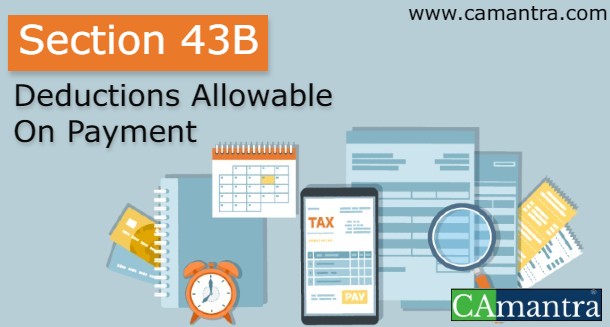As a taxpayer, you might be claiming different expenses & exemptions to lesser your income tax liability, but do you know that there are some deductions that you cannot claim unless you have actually paid for them. Let’s discuss the income tax provisions laid out under Section 43B of the Income Tax Act. Section 43B prescribes that specific statutory expenses could be claimed only in the year of actual payment. This section disallows the expenses which are not paid in the FY or prior to the due date of filing ITR. In brief, Section 43B deals with specific types of payments and guides an assessee to claim this kind of payment as an expense in the assessment year in which it’s actually paid and not in the year where the liability for this kind of payment was incurred.
For example, Mr. X, owner of a company employing 100 people, has paid the provident fund (PF) which is due to be paid to his employees in August 2019. This sum of PF relates to March 2019. In this case, Mr. X can claim the payment of PF as the deduction for the financial year ending March 2019 itself by showing the proof of payment of PF while filing his return in September 2019 as he has paid on or before the due date of filing the ITR. However, if Mr. X fails to pay the PF on or before the due date of filing the ITR and pays it in October 2019, this deduction would be available for a deduction for the FY ending March 2020.
These are the Deductions under section 43B that are allowed only on actual payment
Taxes – Any tax, cess, duties or fees that are paid under any law for the time being in force are allowed as a deduction only when paid.
Contribution to Benefits of Employee – Contribution to any recognized benefit fund of employee by the employer such as provident fund, gratuity, superannuation fund, before the due date for depositing such funds or before the due date of filing ITR.
Bonus or commission – Bonus or commission should be the actual bonus/commission which is paid to the employees.
Interest on borrowings – Interest on loans borrowed here belongs to the interest payable on the loans borrowed by the taxpayer from a public financial institution, state financial institution, state industrial investment corporations and are based on the t&C of such contract. Such payment of interest on the loan availed from aforesaid institutions and also from scheduled banks will be allowed as a deducted from the business income of taxpayer. Also, if the interests have been converted into a loan, such conversion won’t be considered as a payment of interest and would not be allowed as a deduction.
Leave Cncashment – leave encashment count as the sum of money paid that an employer pays to the employees leaving the organization for their unutilized leaves.
Payment to Indian Railways – An assessee can claim the payment as an expense to Indian railways if it has been remitted to the accounts of Indian railway in the financial year or before making the ITR. If such payment is remitted after the due date of filling the income tax returns, such expense would be allowed as a deduction in the year of actual payment.
Thus, for assessees having income from business or profession and maintaining their books of accounts under the mercantile basis of accounting, it’s crucial to keep in mind the above provisions, otherwise, they may not be enabled to such deductions.

